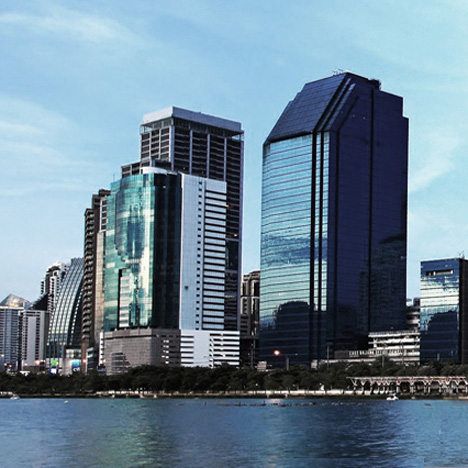Dezeen News: The government of Honduras has given the go-ahead for three privately run cities with "their own police, laws, government and tax systems", according to ABC News.
Work will start on infrastructure for the first "Model City", near Puerto Castilla on the Caribbean coast, with US investment group MGK providing $15 million in initial funding. Subsequent cities could be built in the Sula Valley and the south of the country.
Also involved is Future Cities Development Inc, which is "seeking to build a chartered city within an uninhabited special development region in Honduras", according to its website. It adds: "We believe that by bringing the Silicon Valley spirit of innovation to Honduras, we can build a unique city that enables the Honduran people to lift themselves out of poverty and play a greater role in the global economy."
Top, above and below: images from the Future Cities Development Inc website.
The Model City concept is designed to attract foreign investment to the Central American republic, which suffers from a high crime rate and political instability. The Guardian claims the idea is a development of the "charter cities" concept proposed by American economist Paul Romer, which advocates strong, independent cities as engines of trade and growth, with Singapore, Hong Kong and Dubai held up as models.
The Honduran authorities predict the three cities will create 5000 direct and indirect jobs within a year, rising to 45,000 in 2015. The cities will be allowed to develop their own trade and investment strategies and immigration policies.
On Tuesday, Honduran government agency COALIANZA, the Comisión para la Promoción de Alianzas Público-Privadas [Commission for the Promotion of Public-Private Partnerships] signed an agreement allowing the project to go ahead, stating that the cities would be built in depopulated areas and would not involve the displacement of existing communities, but that they needed to be located close to existing airports and ports.
Left wing publication Envío described the Model City concept as "miniscule states within the State" and compared them to "tax havens where slavery is practiced," while Honduras Culture and Politics linked the development to the neoliberal policies of Milton Friedman, claiming the American economist's grandson, Patri Friedman, is linked to Future Cities Development Inc.
Envío claimed Honduras was being used as a "guinea pig" for imported ideas and quoted constitutional lawyer Carlos Augusto Hernández as saying: “Model cities are the cynical expression of an oligarchy that, feeling triumphant, persists in acting behind the back of the rule of law".

